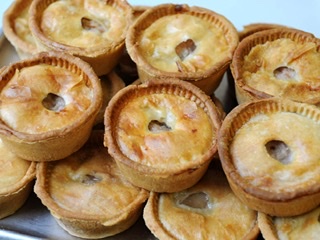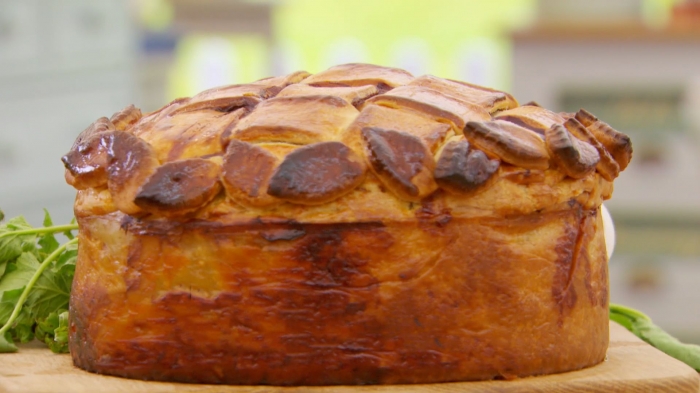Close But No Cigar and other interesting sayings - an etymology thread
I was taught that the proof was indeed in the pudding, as the ‘proof’ was an indication of the strength of alcohol of the brandy used for soaking the mincemeat (fruit) etc and then for soaking the pudding for weeks/months in the lead-up to Christmas/the coronation/major wedding/major feast etc. Remember: no refrigeration back then and often there were large crowds for catering staff to consider.
Remember too the ‘proof’ is another term for the rising stages of yeast-based doughs (breads, buns, fancy pastries, some fancy savoury ‘puddings’ etc). If the dough is insufficiently proved, the dough is flat and doesn’t bake well, resulting in an unpleasant appearance - uneven and ‘half-baked’, in fact.
tomcat said:
On one trip to London (ca. 1968), I seem to recall getting a coin marked as a florin (issued some time in the 1920s).
I believe it was the same as a shilling?
No. A florin was worth two shillings.
Interesting for numismatics, but I suspect not used for Christmas puddings over here 
DaveSchmidt said:
jfinnegan said:
The story I had heard with p's and q's was if a fight would break out in a pub they would tell people to mind their p's(pints) and q's (quarts)
I had never heard the term “quart” until I came to the US, and I have definitely never heard it used in regards to glass sizes.
Ridski & finnegan, do you think perhaps the beer schooners (and other sizes of drink glass) might have been the confusing issue especially for sailors and other, umm, hardworking travellers?
https://en.wikipedia.org/wiki/Schooner_(glass)
It seems that the sizes changed between countries even the names were the same.
OK, bringing this out of currency, I found this -
The proverb, " The proof of the pudding is in the eating ", dates back to at least the 14th century. The phrase is widely attributed to the Spanish author Cervantes in his novel The Ingenious Gentleman Don Quixote. The phrase is often incorrectly stated as "the proof is in the pudding."
Speaking of pudding.......
marksierra said:
That expression has changed over the years.
https://www.npr.org/2012/08/24/159975466/corrections-and-comments-to-stories
From the article: "Zimmer adds that the word pudding itself has changed. In Britain, dating back centuries, pudding meant more than a sweet dessert."
One of my favorite parts of watching the British Baking Show is when they do pudding and trying to understand (in vain) what does and doesn't count as a pudding. Here a pudding is pretty strictly the semi-liquid dessert (eg chocolate pudding, tapioca pudding).
Also, is it just me or does Paul Hollywood have an anti-American bias in desserts? I think it was pies or something, but I recall him complaining about our pies being too sweet. Maybe he's just never had a perfectly fresh apple pie.
PVW said:
marksierra said:
That expression has changed over the years.
https://www.npr.org/2012/08/24/159975466/corrections-and-comments-to-storiesFrom the article: "Zimmer adds that the word pudding itself has changed. In Britain, dating back centuries, pudding meant more than a sweet dessert."
One of my favorite parts of watching the British Baking Show is when they do pudding and trying to understand (in vain) what does and doesn't count as a pudding. Here a pudding is pretty strictly the semi-liquid dessert (eg chocolate pudding, tapioca pudding).
Also, is it just me or does Paul Hollywood have an anti-American bias in desserts? I think it was pies or something, but I recall him complaining about our pies being too sweet. Maybe he's just never had a perfectly fresh apple pie.
Not only Paul Hollywood and, admittedly, I haven't visited north America for years, but even then I thought your desserts were miles too sweet.
Speaking of pudding, there's also Sago pudding.
Many years ago, I asked a guest on my radio program how to start a pudding race. I'm told you could hear the groan from one side of the state to the other.
Oh, the answer? Sago.
I’ve never seen the program however I read something the other week that alluded to the surprise many Americans have when they discover the range of delicious fresh hot savoury closed pies that are eaten in both UK and Australia. Even more than the sweeter dessert pies you all know and love so much.
You hear the word ‘pie’ and usually think something like ‘sweet’ like apples, cream, ice cream etc.
We hear ‘pie’ and think ‘steaming chunks of soft beef, oozing gravy, rivers of tomato sauce [ketchup]’, ‘stains on front of shirt & tie; burnt tongue; hot soft pastry breaking off at my mouth and falling on my lap...’ - there’s no way you can eat a hot pie neatly, even if it’s double-bagged - and then there’s the eternal question: should I get the hot chips too??
It’s a bit like pumpkin: you tend to think of either carving them for Halloween or mashing them into a sweet pie filling. Instead we drool at the thought of thick, creamy, savoury pumpkin soup or just roast/bake chunks until they’re super-soft and naturally nutty/sweet-but-slightly-spicy and smother the chunks with butter, salt, pepper...
There was one season where, for pie week, someone made some kind of pork pie. It looked like a brick. I'm sure it was delicious, but omg you could probably build houses out of it.
joanne said:
and then there’s the eternal question: should I get the hot chips too??
Or, as is asked in the States, "Do you want fries with that?"
PVW said:
There was one season where, for pie week, someone made some kind of pork pie. It looked like a brick. I'm sure it was delicious, but omg you could probably build houses out of it.
I could go for a nice cold slice of pork pie with some mustard right now.
mjc said:
"Mind your p's and q's" i had heard was from typesetting, where the lower case p's and q's would be easily mixed up, esp. since the typesetter was reading them backwards. Not verified.
"Bollocks," was that the word my dad was actually saying, always in the phrase i heard as "all bollixed up," for something messed up, tangled, confused?
Bollocks, 14th century, Bulls balls.
Proper chips and US fries are nothing alike  For some unknown reason, proper reason proper chips are now marketed as ‘steak-cut chips’
For some unknown reason, proper reason proper chips are now marketed as ‘steak-cut chips’
marksierra said:
joanne said:
and then there’s the eternal question: should I get the hot chips too??
Or, as is asked in the States, "Do you want fries with that?"
I knew the hat but never bothered to picture the eponym, until now.
My wife makes a really good shepherd's pie. I have no idea if actual shepherds ate this as the main meat is ground beef and not sheep.
I think this might be the pie I was remembering. It's a game pie from season 3
RobertRoe said:
My wife makes a really good shepherd's pie. I have no idea if actual shepherds ate this as the main meat is ground beef and not sheep.
If it's made of beef, it's technically Cottage Pie. I'm about to have vegan Shepherd's Pie, though, so I don't judge on nomenclature matters anymore.
PVW said:
I think this might be the pie I was remembering. It's a game pie from season 3
Oh yeah, you could probably dam the Hudson with that one.
Now I am hankering for a good Shepards Pie and a Black N Tan to go with it. I'll have to 'settle' for homemade Matzah Ball Soup and brisket. If you could ship me a good meat pie, I would forever be grateful but only me (because no one here likes that stuff).
There used to be a shop at Chelsea Market that did Australian meat pies, but a quick google shows that it closed a few years back, unfortunately:
https://patch.com/new-york/chelsea-ny/tuck-shop-shutter-chelsea-market-outpost-months-end-owner
RobertRoe said:
My wife makes a really good shepherd's pie. I have no idea if actual shepherds ate this as the main meat is ground beef and not sheep.
No. A shepherds pie is lamb. Not necessarily ground, often it was a way to finish the remains of the joint from a Sunday roast. If you use beef, it's a 'cottage pie".
shepherds carried their meals around in their large pockets or over- shoulder bags. Usually these meals were chunks of bread, small hard rounds of cheese, gourds of water or ‘small beer’ and yes - shepherd’s pie made of minced meats, gravies, mashed vegetables all layered and easy to fit into a hand to eat and put back into your pocket if you had to work quickly .
I’d share some of my pork, shepherd’s and cottage pies — but I’m afraid I et ’em all.
Uh, gee. Sorry.
You know, I’ve gone through my collection of recipes from the 13th to 15th centuries (Britain, France, Italy, Spain) and I really can’t find the ‘pudding’ sausages confusion that was mentioned earlier. There’s slightly more confusion for us with the galantines, blank mange (a runnier custard than ours and both savoury and sweet) and gellies/jellies, but that’s mainly because the writing is so poor.
The adage wouldn’t hold as a saying if it were meant to be ‘eating’ simply because most of those dishes wouldn’t keep their shape if not made properly (so perhaps that’s the ‘proof’?).
The other question that arises is that of contamination: spoilage or poison? In this sense, the act of eating would be more important. (Note, I’m happy to go with the attribution to Cervantes)
my books include To The King’s Taste (a moveable feast collection of recipes for Richard 11, the Forme of Cury (a, early medieval cook’s book)
TheJmon said:
Now I am hankering for a good Shepards Pie and a Black N Tan to go with it. I'll have to 'settle' for homemade Matzah Ball Soup and brisket. If you could ship me a good meat pie, I would forever be grateful but only me (because no one here likes that stuff).
speaking of Black and Tan, do NOT ever order one in a real Irish pub. Unless you're looking for a fight.
Why You Shouldn’t Order a “Black and Tan” This St. Patrick’s Day
joanne said:
my books include To The King’s Taste (a moveable feast collection of recipes for Richard 11, the Forme of Cury (a, early medieval cook’s book)
Funny to think about how different "traditional" European cuisines would have been pre-1492. Meat and potatoes, hold the potatoes.
And, depending when you’re writing, tomatoes, squash, many fruits we take for granted, decent wines, variety in cheeses...
PVW said:
Funny to think about how different "traditional" European cuisines would have been pre-1492. Meat and potatoes, hold the potatoes.
Keep in mind, that there was a world of a difference between the menu in the castle, and what the peasants ate (gruels & rye bread, an occasional stew).




























https://en.wikipedia.org/wiki/Proof_coinage